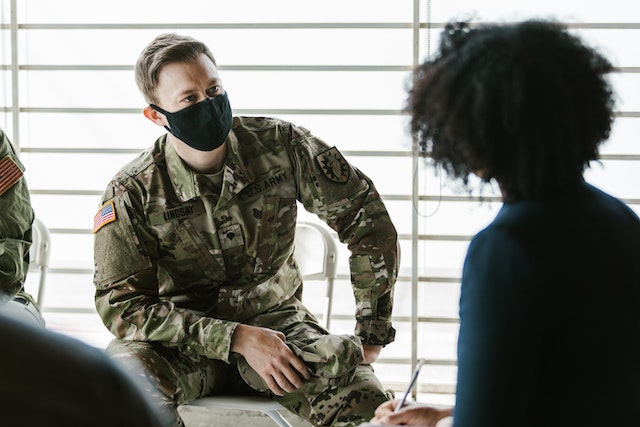Home Healthcare for Veterans: Honoring Those Who Served
Home Healthcare for Veterans: Honoring Those Who Served
Home healthcare for veterans is a crucial aspect of providing specialized medical support and services to those who have served our country. Veterans often face unique health challenges resulting from their time in service, and it is essential to ensure they receive the care and assistance they deserve. In this blog post, we will explore the importance of home healthcare for veterans, the services available to them, the challenges they may encounter, and the initiatives taken to address their needs.
Get Better With Algebra Healthcare

Visit our Social Media & Read Blogs
Your Good Health Is Just A Call Away
+971 501 317 063 / 800 200 100

The Significance of Home Healthcare for Veterans
Home healthcare plays a vital role in the lives of veterans, particularly those with disabilities, chronic conditions, or age-related issues. For many veterans, transitioning from active duty to civilian life can be challenging, and their healthcare requirements may differ significantly from those of the general population. Home healthcare enables veterans to receive personalized medical attention in the comfort of their own homes, fostering a sense of independence and dignity.
Health Challenges Faced by Veterans
Service-Related Injuries:
Many veterans experience physical injuries during their time in service, ranging from limb loss and traumatic brain injuries (TBI) to post-traumatic stress disorder (PTSD).
Exposure to Harmful Agents:
Some veterans are exposed to hazardous substances during their deployments, leading to long-term health issues such as respiratory problems or cancers.
Mental Health Issues:
The emotional toll of military service can result in mental health challenges, including depression, anxiety, and PTSD.
Age-Related Conditions:
As veterans age, they may face common health concerns, such as cardiovascular diseases, diabetes, and mobility issues.
Home Healthcare Services for Veterans
Skilled Nursing Care:
Trained healthcare professionals provide complex medical care, wound management, medication administration, and more.
Physical and Occupational Therapy:
Therapists work with veterans to improve mobility, manage pain, and enhance daily living skills.
Home Health Aides:
Supportive care aides assist with activities of daily living, including bathing, dressing, and meal preparation.
Medical Equipment and Supplies:
Veterans may receive specialized medical equipment and supplies tailored to their unique needs.
Palliative Care and Hospice Services:
For veterans in the later stages of life or facing terminal illnesses, palliative care and hospice services offer comfort and support.
Challenges and Barriers to Home Healthcare for Veterans
Access to Services:
Some veterans may live in rural or remote areas, making it difficult to access home healthcare services due to limited availability.
Funding and Insurance:
Navigating the complexities of insurance coverage and funding options can be challenging for veterans and their families.
Caregiver Support:
Family caregivers play a vital role in providing care for veterans at home. However, they may face physical, emotional, and financial strains.
Mental Health Stigma:
Veterans experiencing mental health issues may hesitate to seek help due to the stigma surrounding mental health in the military culture.
Initiatives and Programs Supporting Home Healthcare for Veterans
Veterans Health Administration (VHA):
The VHA, part of the Department of Veterans Affairs (VA), offers a range of home healthcare services specifically designed for veterans, including the Home-Based Primary Care (HBPC) program.
Community-Based Home Care Programs:
Numerous organizations and non-profits work to supplement government programs by providing home healthcare services and caregiver support.
Telehealth and Remote Monitoring:
Utilizing technology, telehealth services allow veterans to connect with healthcare professionals remotely, improving access to care, especially in rural areas.
Caregiver Support Programs:
The VA offers caregiver support programs, providing training, respite care, and financial assistance to caregivers of eligible veterans.
Accessibility and Convenience
For many veterans, travel to medical facilities can be burdensome, especially if they live in rural or remote areas. Home healthcare brings medical services directly to their doorstep, eliminating the stress and difficulties associated with transportation. This level of accessibility ensures that veterans receive timely and consistent care, reducing the likelihood of exacerbating their health conditions.
Tailored and Specialized Care
Veterans’ health needs are diverse and unique. Home healthcare providers are trained to deliver specialized care that caters to individual requirements. Whether it involves managing chronic pain, administering medication, or providing physical therapy, personalized care plans are crafted to address the distinct challenges faced by veterans.
Promoting Independence and Dignity
Home healthcare empowers veterans to maintain a sense of independence and dignity within the familiarity of their homes. This aspect is particularly important for elderly veterans who may require assistance with daily activities but wish to retain their autonomy.
Challenges and Solutions in Home Healthcare for Veterans
While home healthcare offers numerous advantages, implementing and providing these services for veterans also come with specific challenges. Addressing these hurdles is crucial to ensuring that our veterans receive the best possible care.
Funding and Resources
One of the primary challenges faced by home healthcare providers is securing adequate funding and resources to deliver quality services to veterans. Government agencies, non-profit organizations, and private entities must work collaboratively to allocate resources and financial support to expand and sustain home healthcare programs.
Training and Education
Home healthcare providers require specialized training to understand the unique needs of veterans. This includes training in military culture, the impact of trauma, and dealing with PTSD and other mental health issues. Investing in comprehensive training for healthcare professionals ensures that veterans receive the compassionate and knowledgeable care they deserve.
Home healthcare for veterans is an essential aspect of ensuring the well-being and quality of life of those who have sacrificed so much for our nation:
By recognizing and addressing their unique healthcare needs, we can honor their service and show our gratitude for the sacrifices they have made. It is vital for government agencies, non-profits, and the community to work together in providing comprehensive home healthcare services, easing the transition from military to civilian life and improving the lives of our veterans in the comfort of their own homes. Let us continue to support and care for those who have served with honor and dedication, standing by their side in their time of need.

